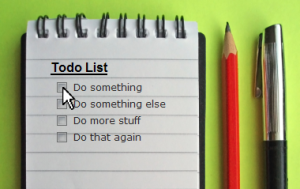Despite how technology-driven our society has become, I know that I am not alone in carrying a physical agenda-book in which I write down tasks to be done and reminders for myself. At the end of each class when the instructor reminds us of homework and assignments due, I open my book bag and immediately transcribe the details into my beloved agenda. When I finally finish a task from my agenda, I cross it out in pen to really mark an end to the assignment, and it feels really empowering; sort of like a “self-five” for getting my work done! But why do we get so much satisfaction out of crossing things off of our to-do lists?
Something called the Zeigarnik effect might hold the key to understanding this infatuation with to-do lists.  In 1927, Russian psychologist, Bluma Zeigarnik completed a series of experiments in which adults and children were asked to complete a variety of tasks including, “manual work (constructing a box of cardboard, making clay figures, etc.) and… mental problems such as puzzles, arithmetic, and the like.” In the different studies, Zeigarnik allowed half of each group to finish the task they were given, but interrupted the other half mid-way through, not allowing them to complete it. The participants were questioned an hour after the end of the experiment to see if they remembered the details of the tasks. In one case, 12% of those who had completed the task were able to recall it, while 80% of those who were interrupted could recall. After repeating the experiments multiple times, Zeigarnik and her partners concluded that uncompleted tasks stick in peoples’ minds much better than those that were completed.
In 1927, Russian psychologist, Bluma Zeigarnik completed a series of experiments in which adults and children were asked to complete a variety of tasks including, “manual work (constructing a box of cardboard, making clay figures, etc.) and… mental problems such as puzzles, arithmetic, and the like.” In the different studies, Zeigarnik allowed half of each group to finish the task they were given, but interrupted the other half mid-way through, not allowing them to complete it. The participants were questioned an hour after the end of the experiment to see if they remembered the details of the tasks. In one case, 12% of those who had completed the task were able to recall it, while 80% of those who were interrupted could recall. After repeating the experiments multiple times, Zeigarnik and her partners concluded that uncompleted tasks stick in peoples’ minds much better than those that were completed.
The Zeigarnik effect may explain why we love crossing things off of our to-do lists, and why procrastination stresses us out so much. Once an individual completes a task, crossing it off of their to-do list (literally or figuratively) immediately relieves their brain of that burden because they no longer have to store it in their memory. Procrastinating, on the other hand, forces us to keep that task in the back of our minds until it is completed, causing us increasing stress and frustration.
If you tend to be a procrastinator (like me…), there is a way to beat this effect, and start being more efficient! A BBC article suggests breaking down huge and seemingly impossible projects on your to-do list into smaller, more manageable tasks. Instead of telling yourself to “read entire chapter of Biology textbook before the next exam”, schedule yourself smaller increments of work such as “read pages 1-25 tonight, pages 25-50 on Tuesday, etc.…” This will help reduce the Zeigarnik effect, and help you stay sane when you have a lot of work to get done.


I am obsessed with writing to-do lists. I always write the and then stick them in my planner, which I am also obsessed with. I never knew that there have been studies conducted about them. I am a very anxious person and I have noticed that I am more relaxed as a result of writing to-do lists. I still procrastinate everything though!
Aa a lazy person, I used to remember things I need to do in my mind. After several times failure, I started to add “To Do List” recently. The Zeigarnik effect really answers my question and lead a path what I should to do. Thank you~